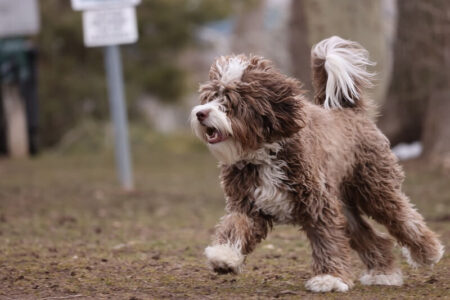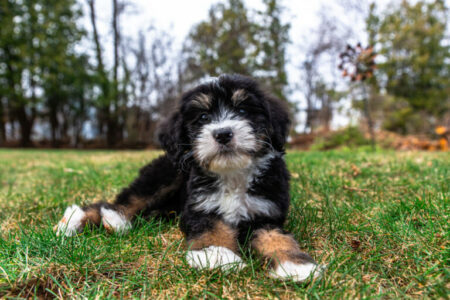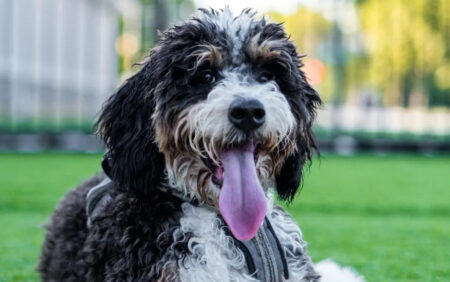The Bernedoodle is a relatively new hybrid dog breed that has been gaining popularity as the “perfect” family pet. This unique breed is a cross between a Bernese Mountain Dog and a Poodle, resulting in a hypoallergenic and low-shedding dog that is known for their friendly and lovable personality. They have quickly become a popular choice for families who want a companion that is not only great with children but also adaptable to various living situations.
In this article, we will explore the history and characteristics of the Bernedoodle and how it has become a beloved family pet for many households. We will also discuss the traits that make this breed so suitable for families, including their intelligence, playfulness, and loyal nature. Lastly, we will touch upon the responsibilities and considerations of owning a Bernedoodle, as well as some training and care tips for potential owners. By the end of this essay, you will have a better understanding of why the Bernedoodle is considered the perfect family pet.
Bernedoodle: The Perfect Family Pet
The Bernedoodle, also known as the Bernese Mountain Poo, is a designer dog breed that is a mix between a Bernese Mountain Dog and a Poodle. They are typically bred to combine the intelligence and hypoallergenic coat of the Poodle with the gentle and loyal nature of the Bernese Mountain Dog. They are a relatively new breed with origins dating back to the early 2000s.
Height:
The Bernedoodle’s height can vary depending on the size of the Poodle parent they are derived from. On average, they range from 18 to 22 inches tall at the shoulder.
Weight:
The weight of a Bernedoodle can also vary, but they generally range from 25 to 90 pounds. Mini Bernedoodles, which are bred from a smaller Poodle parent, can weigh between 10 to 24 pounds.
Lifespan:
Bernedoodles have a lifespan of 12 to 15 years, which is similar to their parent breeds.
Colors:
Bernedoodles can come in a variety of colors, including black, white, brown, and combinations of these colors.
Temperament:
Bernedoodles are known for their friendly and outgoing personality. They are loyal and loving companions, making them great family dogs. They are also intelligent and eager to please, which makes them easy to train. However, they can also have a stubborn streak, so consistent and patient training is important. They have a moderate energy level, so they are happy to join their owners on walks and hikes, but they also enjoy lounging and cuddling at home.
Grooming:
Due to their Poodle heritage, Bernedoodles have a hypoallergenic coat that sheds minimally. Their coat can vary from wavy to curly, and they will require regular brushing to prevent matting. They may also need to be groomed every few months to keep their coat looking neat and tidy.
Exercise:
Bernedoodles have moderate exercise needs and can adapt to different lifestyles. They will benefit from daily walks or playtime in a fenced yard, but they can also adapt to apartment living with enough exercise.
Training:
Bernedoodles are intelligent and eager to please, making them relatively easy to train. They respond well to positive reinforcement and reward-based training methods. Early socialization and training are recommended to ensure they grow up to be well-mannered and well-adjusted dogs.
Is a Bernedoodle Good With Kids?
Yes, Bernedoodles are generally good with kids. They are known for their friendly and gentle temperament, and their patience and affection make them great companions for children. Bernedoodles are also highly adaptable and can adjust to different energy levels and environments, making them ideal for families with children of varying ages. However, as with any dog, proper socialization and supervision are key to ensuring a positive relationship between the dog and children.
Does my Bernedoodle Need a Lot of Exercises?
Like all dogs, Bernedoodles require daily exercise to keep them physically and mentally healthy. The amount of exercise they need may vary based on their age, size, and individual energy levels, but in general, Bernedoodles will benefit from at least 30-60 minutes of exercise each day.
As a hybrid breed of the energetic Poodle and the laid-back Bernese Mountain Dog, Bernedoodles are generally active and playful but also tend to relax and lounge. They are considered to be a medium to high-energy breed and will need regular exercise to burn off excess energy and prevent boredom.
Some Bernedoodles may have a higher energy level and require more exercise, while others may do well with less. It is important to pay attention to your individual dog’s needs and adjust their exercise routine accordingly.
Exercise for Bernedoodles should include a mix of physical activities and mental stimulation. This can include walks, runs, hikes, playtime, and training sessions. Bernedoodles also enjoy activities such as swimming, agility courses, and interactive toys.
History of Bernedoodle
The Bernedoodle, also known as the Bernese Mountain Poo, is a mixed breed dog that is a cross between a Bernese Mountain Dog and a Poodle. This hybrid breed was created in the 1990s in North America, to combine the desirable traits of both parent breeds.
The Bernese Mountain Dog, also known as Berner, is a large breed that originated in the Swiss Alps. They were originally bred as working dogs, known for their strength and endurance in pulling carts and herding livestock. They also have a gentle and loyal disposition, making them great family dogs.
The Poodle, on the other hand, originated in Germany and was bred as a hunting dog. They are known for their intelligence, agility, and hypoallergenic coat. Poodles come in three different sizes – standard, miniature, and toy.
The first recorded Bernedoodle litter was bred by Sherry Rupke in 2003 in the United States. Rupke was a breeder who wanted to create a dog with the low-shedding coat of a Poodle and the calm and loyal nature of a Bernese Mountain Dog. She used a miniature Poodle and a Bernese Mountain Dog to create her first litter of Bernedoodles.
Since then, the Bernedoodle has gained popularity and has become a sought-after designer breed in North America and other parts of the world. They are known for their gentle and loving nature, as well as their hypoallergenic and low-shedding coat. Bernedoodles also often inherit the intelligence and trainability of their Poodle parent, making them easy to train.
The Bernedoodle is recognized by a few dog registries, such as the American Canine Hybrid Club and the International Designer Canine Registry. However, they are not yet recognized by the American Kennel Club (AKC) as a purebred breed.
Today, Bernedoodles are not only popular as family pets but also as therapy and service dogs due to their calm and gentle nature. They are also used in some countries as search and rescue dogs.
SEE ALSO: Husky: Wolf-Like Dog
Characteristics of Bernedoodle
- Size: Bernedoodles are a medium to large-sized breed, typically weighing between 50-90 pounds and standing 18-22 inches tall.
- Coat: The coat of a Bernedoodle can vary from straight to wavy or curly, depending on the type of poodle used in the breeding process. They can have a variety of colors, including black, brown, white, and combinations of these colors.
- Temperament: Bernedoodles are known for their friendly and affectionate personalities. They are sociable and do well with both people and other pets. They are also intelligent and easy to train.
- Energy Level: Bernedoodles are moderately active dogs, but their energy level can vary depending on the specific traits they inherit from the Bernese Mountain Dog and Poodle. They require regular exercise to stay healthy and happy.
- Lifespan: The average lifespan of a Bernedoodle is around 12-15 years, but this can vary depending on a variety of factors such as diet, exercise, and overall health.
- Grooming: Bernedoodles have non-shedding coats that require regular grooming to prevent matting and tangles. Brushing once or twice a week and occasional professional grooming is recommended.
- Health: Like all dog breeds, Bernedoodles can be prone to certain health issues such as hip dysplasia, eye problems, and allergies. However, with proper care, they are generally a healthy breed.
- Family Compatibility: Bernedoodles make great family pets due to their friendly and gentle nature. They do well with children and can adapt to different living situations, but they do require a decent amount of space for play and exercise.
- Trainability: Bernedoodles are easy to train and eager to please their owners. With consistency, positive reinforcement, and proper socialization, they can excel in obedience training.
- Activity Level: While not as high-energy as some other breeds, Bernedoodles do require regular exercise to stay healthy and happy. They enjoy activities such as walks, hikes, and games of fetch, but they are also content with lounging at home with their family.
Appearance of Bernedoodle
The Bernedoodle is a cross between a Bernese Mountain Dog and a Poodle. These dogs can vary in appearance, depending on the specific traits they inherit from their parents. In general, Bernedoodles are large dogs with thick, wavy, or curly coats. They may have the traditional tricolor pattern of the Bernese Mountain Dog, or they may have a solid color coat like the Poodle. They usually have a round face with a black nose and dark, round eyes. Their ears are typically floppy and they have a long, fluffy tail. Their legs are straight and their paws are large.
Temperament of Bernedoodle
Bernedoodles are known for being friendly, affectionate, and loyal dogs. They love being around people, and they are especially good with children. They are also intelligent and easy to train, making them a great choice for first-time dog owners. Bernedoodles are also known for being calm and relaxed. However, they can also be playful and energetic when they are allowed to run and play. Overall, the Bernedoodle is a well-rounded and easy-going dog that can be a great addition to any family.
Cost of Bernedoodle
On average, the cost of a Bernedoodle can range from $2,000 to $4,000, depending on factors such as breeder reputation, geographical location, and bloodline. Some breeders may also charge more for certain coat colors or patterns. Additionally, the cost may vary if you adopt a Bernedoodle from a rescue organization. It’s important to do thorough research and find a reputable breeder who follows ethical breeding practices.
Health Conditions of Bernedoodle
Bernedoodles are a relatively healthy crossbreed, inheriting the traits of both the Bernese Mountain Dog and the Poodle. However, like all dogs, they are prone to certain health conditions that owners should be aware of.
- Hip Dysplasia: This is a common condition in large breeds, including the Bernese Mountain Dog. It is the abnormal development of the hip joint, which can lead to pain, stiffness, and arthritis.
- Elbow Dysplasia: Similar to hip dysplasia, this condition affects the elbows and can cause lameness, discomfort, and arthritis.
- Progressive Retinal Atrophy (PRA): PRA is a hereditary disease that affects the retina and can lead to blindness in dogs.
- Von Willebrand’s Disease: This is a blood disorder characterized by a deficiency in a specific clotting factor, which can lead to excessive bleeding and bruising.
- Gastric Dilatation-Volvulus (GDV): Also known as bloat, this condition is a life-threatening emergency that occurs when the stomach twists and fills with gas, cutting off blood supply to the surrounding organs.
- Allergies: Bernedoodles can be prone to allergies, both environmental and food-related.
- Epilepsy: Like many other breeds, Bernedoodles can be affected by epilepsy, a neurological disorder that causes seizures.
How to Care for Bernedoodle
- Grooming: Bernedoodles have a curly and wavy coat that requires regular grooming to keep it clean and free of mats. They should be brushed at least once a week, and a professional grooming session every 4-6 weeks is recommended. It would help if you also trimmed your nails regularly to prevent overgrowth and discomfort.
- Exercise: Bernedoodles are energetic dogs and require daily exercise to stay healthy and happy. Aim for at least 30 minutes of exercise per day, including walks, runs, playtime, or indoor games. They also love to swim, so taking them to a nearby lake or pool can be a great form of exercise for them.
- Socialization: Bernedoodles are social dogs and enjoy being around people and other animals. It is essential to socialize them from a young age to help them develop good behavior and manners. Expose them to different people, places, and animals to prevent them from becoming fearful or aggressive.
- Training: Bernedoodles are intelligent dogs and learn quickly, making them relatively easy to train. Starting training and socialization as early as possible is important to prevent any behavioral issues from developing. Positive reinforcement techniques work best with this breed, so reward them with treats, praise, and affection when they exhibit good behavior.
- Nutrition: A well-balanced and nutritious diet is essential for the health and well-being of your Bernedoodle. Choose a high-quality dog food that meets their nutritional needs depending on their age, size, and activity level. Avoid overfeeding and monitor their calorie intake to prevent them from becoming overweight, which can lead to health problems.
- Health care: Like all dogs, Bernedoodles require regular health check-ups, vaccinations, and preventative care to stay healthy. It is also essential to keep up with routine grooming tasks, such as cleaning their ears and teeth, to prevent any infections and maintain good oral hygiene.
- Attention and love: Bernedoodles are affectionate and loving dogs that thrive on attention and human companionship. They make excellent family dogs and should not be left alone for long periods. Make sure to spend quality time with your Bernedoodle, provide them with plenty of love and attention, and you will have a happy and well-adjusted dog.
SEE ALSO: Boxer Dog: All You Need To Know About This Breed
FAQs
Q. Are Bernedoodles good family pets?
A. Bernedoodles are considered to be great family pets. They are known for being affectionate, friendly, and loving towards all members of the family, including children.
Q. What is the personality of a Bernedoodle?
A. Bernedoodles are known for their sweet, gentle, and affectionate personalities. They are friendly and outgoing, and they get along well with other dogs and people of all ages. They are also known for being very intelligent and trainable, and they are quick learners.
Q. Can Bernedoodles be left alone?
A. While all dogs are individuals, most Bernedoodles can be left alone for short periods.
Q. What is the best thing about Bernedoodles?
A. One of the best things about Bernedoodles is their loving, gentle, and affectionate personalities. They are known for being very friendly and social dogs that enjoy spending time with their families. They are also intelligent and easy to train, and they are often eager to please their owners. Additionally, Bernedoodles are low-shedding and hypoallergenic, making them a good choice for people with allergies.
Conclusion
In conclusion, the Bernedoodle is a wonderful family pet that has gained popularity for its loving, sociable, and intelligent nature. This cross between a Bernese Mountain Dog and a Poodle combines the best qualities of both breeds, making it an ideal pet for families.
One of the standout characteristics of the Bernedoodle is their affectionate and gentle nature. They crave attention and love to be around their owners, making them excellent companions for families, especially those with children. They also have a playful and fun-loving personality, making them great playmates for kids.
In terms of trainability, the Bernedoodle is highly intelligent and quick to learn, making training relatively easy. They are also very adaptable and can thrive in a variety of living situations, from small apartments to larger homes.
One of the major benefits of owning a Bernedoodle is their hypoallergenic coat, which sheds minimally and is less likely to trigger allergies in those who are sensitive to pet dander. This makes them a great choice for families with allergy sufferers.


